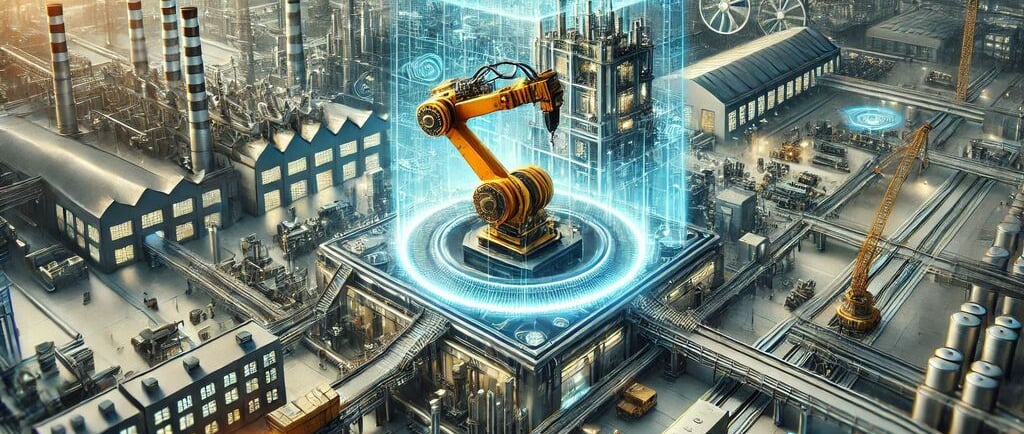Let us collaborate to foster global growth and development together.
The Transformative Impact of Industrial Machinery on the Future of Manufacturing
Explore how advancements in industrial machinery are reshaping the manufacturing landscape, driving efficiency, innovation, and sustainability for the future.
10/31/20243 min read


The Transformative Impact of Industrial Machinery on the Future of Manufacturing
Meta Description: Explore how advancements in industrial machinery are reshaping the manufacturing landscape, driving efficiency, innovation, and sustainability for the future.
The manufacturing industry is experiencing a revolution, and industrial machinery is at its core. Over the past decade, advancements in technology have transformed how factories operate, making them smarter, faster, and more efficient. Whether it’s automation, IoT-enabled equipment, or energy-efficient systems, industrial machinery is redefining the future of manufacturing in groundbreaking ways.
The Rise of Smart Industrial Machinery
Industrial machinery has evolved from basic tools to sophisticated systems embedded with cutting-edge technology. Smart machinery, driven by artificial intelligence (AI) and machine learning, is now capable of:
Real-time Decision-Making: Machines equipped with AI can process vast amounts of data instantaneously, optimizing workflows and minimizing errors.
Predictive Maintenance: Using IoT sensors, smart machinery can predict and prevent breakdowns, reducing downtime and saving costs.
For instance, a modern CNC (Computer Numerical Control) machine can adjust its operations based on real-time conditions, enhancing precision while conserving resources.
Increased Efficiency and Productivity
One of the most significant contributions of industrial machinery to manufacturing is the dramatic increase in efficiency. Automation has:
Streamlined Operations: Automated machinery takes over repetitive tasks, allowing human workers to focus on higher-value activities.
Accelerated Production Cycles: Machines can operate 24/7 without fatigue, ensuring faster output and reduced time-to-market for products.
Example: In automobile manufacturing, robotic arms handle assembly lines with speed and accuracy, producing vehicles at unprecedented rates.
Fostering Innovation Through Customization
Modern industrial machinery enables greater product customization, catering to the growing consumer demand for personalized goods. With technologies like 3D printing, manufacturers can:
Prototype Rapidly: Experiment with new designs quickly and cost-effectively.
Produce Limited Runs: Offer niche products without the financial burden of large-scale production setups.
This innovation has sparked a surge in bespoke products across industries, from healthcare (custom medical implants) to fashion (tailored footwear).
Enhancing Sustainability in Manufacturing
As environmental concerns grow, industrial machinery is pivotal in promoting sustainable practices. Features such as:
Energy Efficiency: Newer machines use less power, significantly lowering the carbon footprint.
Waste Reduction: Precision equipment minimizes material wastage, enhancing resource utilization.
Real-World Insight: A report by the International Energy Agency (IEA) highlights that upgrading to modern machinery can reduce energy consumption in manufacturing by up to 30%.
Challenges in Adopting Advanced Industrial Machinery
Despite its benefits, implementing state-of-the-art industrial machinery comes with challenges:
High Initial Investment: Acquiring and installing advanced machinery can strain budgets, especially for small to medium-sized enterprises (SMEs).
Skill Gaps: Operating complex machines requires training and expertise, which some manufacturers might lack.
Integration Issues: Incorporating new machinery into existing systems may disrupt workflows temporarily.
However, these barriers can be mitigated with strategic planning, government incentives, and training programs tailored to upskill workers.
Future Trends in Industrial Machinery
Looking ahead, several trends promise to shape the next era of manufacturing:
1. Automation Beyond Assembly Lines
From quality control to logistics, automation will permeate every stage of the manufacturing process. Robots equipped with AI could:
Perform intricate quality inspections using computer vision.
Streamline warehouse management by automating inventory tracking.
2. Collaborative Robots (Cobots)
Cobots, designed to work alongside humans, are gaining traction. Their flexibility makes them ideal for:
Small-batch production tasks.
Enhancing workplace safety by handling hazardous materials.
3. Green Manufacturing Innovations
Expect breakthroughs in eco-friendly machinery, such as systems powered by renewable energy and equipment that recycles waste during production.
Conclusion: Embracing the Future of Industrial Machinery
Industrial machinery is more than just a tool for manufacturing; it’s a catalyst for change. By enhancing efficiency, enabling innovation, and supporting sustainability, it lays the foundation for a resilient and forward-thinking manufacturing ecosystem.
As manufacturers embrace these technologies, they not only future-proof their operations but also unlock opportunities for growth and competitiveness in a dynamic global market. If you’re considering upgrading your industrial equipment, now is the time to act.
Call-to-Action: How do you see industrial machinery shaping your industry? Share your insights or questions in the comments below, and explore our in-depth guides on manufacturing innovations for more insights.
Innovation
Cutting-edge solutions for industrial efficiency and productivity.
© 2024. All rights reserved.


